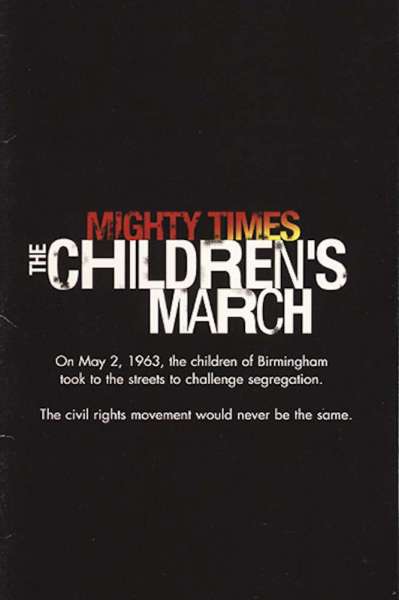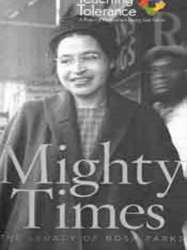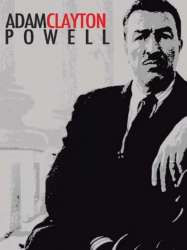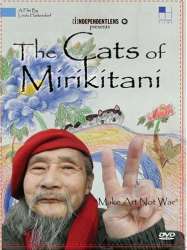Mighty Times: The Children's March is a american film of genre Documentary directed by Robert Houston released in USA on 1 january 2004
Mighty Times: The Children's March (2004)

If you like this film, let us know!
Released in USA 1 january 2004
Length 40minutes
Directed by Robert Houston
OriginUSA
Genres Documentary
Themes Films about racism, Documentary films about racism, Documentary films about law, Documentary films about historical events, Documentaire sur une personnalité, Documentary films about politics, Political films
Rating76%










Mighty Times: The Children's March is a 2004 American short documentary film about the Birmingham civil rights marches. It was directed by Robert Houston and produced by Robert Hudson. The film won an Academy Award in 2005 for Documentary Short Subject. The film was co-produced by the Southern Poverty Law Center and HBO.
Comments
Leave comment :
Suggestions of similar film to Mighty Times: The Children's March
There are 4 films with the same director, 8962 with the same cinematographic genres, 10576 films with the same themes (including 50 films with the same 7 themes than Mighty Times: The Children's March), to have finally 70 suggestions of similar films.If you liked Mighty Times: The Children's March, you will probably like those similar films :
 , 40minutes
, 40minutesDirected by Robert Houston
Origin USA
Genres Documentary
Themes Documentary films about historical events, Documentary films about politics, Political films
Actors Nick LaTour
Rating78%






Mississippi Cold Case (2007)
, 42minutesOrigin Canada
Genres Documentary
Themes Films about racism, Documentary films about racism, Documentary films about law, Documentary films about historical events, Documentaire sur une personnalité, Documentary films about politics, Political films
Rating55%






Adam Clayton Powell (1989)
, 54minutesOrigin USA
Genres Documentary
Themes Films about racism, Documentary films about racism, Documentary films about law, Documentary films about historical events, Documentaire sur une personnalité, Documentary films about politics, Political films
Rating67%





 , 1h27
, 1h27Genres War, Documentary
Themes Films about racism, Films about religion, Documentary films about racism, Documentary films about law, Documentary films about war, Documentary films about historical events, Documentaire sur une personnalité, Documentary films about politics, Documentary films about religion, Political films, Films about Jews and Judaism, Documentary films about World War II
Rating72%





 , 1h4
, 1h4Genres Documentary
Themes Films about racism, Films about terrorism, Documentary films about racism, Documentary films about law, Documentary films about war, Documentary films about historical events, Documentaire sur une personnalité, Documentary films about politics, Documentary films about terrorism, Political films

A City Decides (1956)
, 27minutesDirected by Charles Guggenheim
Origin USA
Genres Documentary
Themes Films about education, Films about racism, Documentary films about racism, Documentary films about law, Documentary films about historical events, Documentaire sur une personnalité, Documentary films about politics, Political films
Rating64%





 , 32minutes
, 32minutesOrigin USA
Genres Documentary
Themes Films about racism, Documentary films about racism, Documentary films about law, Documentary films about historical events, Documentaire sur une personnalité, Documentary films about politics, Political films
Rating73%






The Cats of Mirikitani (2006)
, 1h14Genres Documentary
Themes Films based on the September 11 attacks, Prison films, Films about racism, Films about religion, Films about terrorism, Transport films, Aviation films, Documentary films about the visual arts, Documentary films about racism, Documentary films about law, Documentary films about war, Documentary films about historical events, Documentaire sur une personnalité, Documentary films about politics, Documentary films about religion, Documentary films about technology, Documentary films about terrorism, Political films, Films about Islam, Documentary films about World War II, Disaster films, Films about aviation accidents or incidents, Films about hijackings
Rating81%





In 2001 Japanese American painter, Jimmy Mirikitani (born Tsutomu Mirikitani), and over 80 years old, was living on the streets of lower Manhattan. Filmmaker, Linda Hattendorf, took an interest and began
 , 3h5
, 3h5Directed by Sidney Lumet, Joseph L. Mankiewicz
Origin USA
Genres Documentary
Themes Films about racism, Documentary films about racism, Documentary films about law, Documentary films about historical events, Documentaire sur une personnalité, Documentary films about politics, Political films
Actors Paul Newman, Ruby Dee, Joanne Woodward, James Earl Jones, Clarence Williams III, Burt Lancaster
Rating81%





Film biographique sur Martin Luther King Jr..
 Connection
Connection
